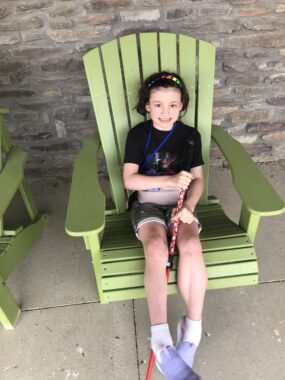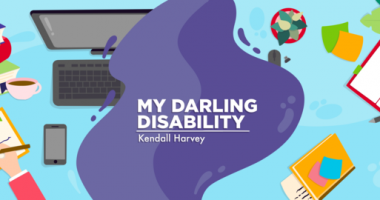Camp provides my child with FA an opportunity to grow
How summer camp can benefit children with disabilities

Amelia went to summer camp! And I’m talking overnight, in-the-woods camp. My 11-year-old daughter, who has Friedreich’s ataxia (FA), had the opportunity to be away from home, get dirty, make new friends, and learn camp songs — all without the watchful and prying eyes of her mother.
It started as most new things do with Amelia — with an excited utterance. We’d been watching “The Parent Trap” as we folded laundry. (If you’re wondering if it was the Lindsay Lohan version or the Hayley Mills version, we like both and watch them in order.) The story is about twins who are separated at birth and then find each other at camp.
It was fresh on Amelia’s mind that evening as we ate dinner. She looked me in the eyes and said, “I want to go to camp. But I want to go to camp camp, a real one you spend the night at.”
The sound at the table came to a crashing halt as Amelia’s older sister, Katherine, and I just stared. I’m not sure if Amelia could read the shock on my face, but my mind started spinning. This child, who often asks for help in completing basic tasks and doesn’t like being away from home, wanted to be released out into the world of camp. My fear was only matched by my longing for her to have typical childhood experiences.
As a child, I loved camp and smile when thinking back to all my adventures. The camp my sisters and I attended created cabins out of covered wagons. It was the definition of rustic. The hills felt huge in my childhood memory, and I remember sore legs from activities and exhausted afternoon naps.
This place is where my child with FA wanted to go. A child who probably needed a camp experience and fun more than most.
The research around the impact of camp on the well-being of youth is significant. As a social worker, I’ve always advocated for camp opportunities from an enrichment perspective because I know the positive general outcomes for children who attend them. Fear melted away to cheering in my mind as I remembered we have a camp here in Ohio for children like Amelia, who have disabilities and serious illnesses.
Forms were completed, everything was lined up, and I was beyond excited. But when Amelia began to change her mind about attending, I knew it was time for me to step back and for her father to step in. Where I’ll often push and cheer on, my husband will empower and let go. Dad and daughter huddled up, created a packing list, pulled a suitcase into her room, and Amelia was left to pack on her own. She moved from uncertain to self-directed and determined.
The camp drop-off protocol allowed for one caregiver to be present, so with a hug and a kiss, I waved goodbye to Amelia and her dad. Remembering her inspiration for attending camp, I shouted out a reminder to watch out for her doppelgänger. I then busied myself with household chores until the details and photos came through from the camp check-in. I knew Amelia was going to have an amazing time thanks to so many volunteers, donors, and caring strangers.
A changed child
Amelia’s week at camp came and went, leaving a changed child in its wake. Her first statement to me at pickup was, “Can I come back next year?”
She’s embraced more self-dependence at home and ruminates less on the negative. The ankle braces she swore she wouldn’t wear pre-camp now sit snugly around her feet within her new shoes. We’ve seen her perform dance moves to camp songs with a smile, but we’ve had to pull stories out of her as if she signed a nondisclosure agreement. I guess what happens at camp stays at camp.

Amelia hangs out at camp registration with her walking stick named Waldo. (Photo by Ryan Hamilton)
Amelia has matured, and I’ll need to recalibrate myself as I support this change. She has gone away and come back, and with that created a stronger sense of independence. What hasn’t changed is our continued love for the “Parent Trap” movies.
Big thank you to Flying Horse Farms. We’ll see you next year.
I’d love to hear about meaningful experiences for your family or child in the comments if you have the time and willingness to share!
Note: Friedreich’s Ataxia News is strictly a news and information website about the disease. It does not provide medical advice, diagnosis, or treatment. This content is not intended to be a substitute for professional medical advice, diagnosis, or treatment. Always seek the advice of your physician or another qualified health provider with any questions you may have regarding a medical condition. Never disregard professional medical advice or delay in seeking it because of something you have read on this website. The opinions expressed in this column are not those of Friedreich’s Ataxia News or its parent company, BioNews, and are intended to spark discussion about issues pertaining to Friedreich’s ataxia.








Comments
Rebecca
I'll never forget my time at camp as a child. My first time, like Amelia, came with so much initial nervous excitement, but the confidence and independence I gained were invaluable. I am so happy that Ohio has an inclusive camp experience for all ability levels! I can't wait to hear about her camp experience next summer.